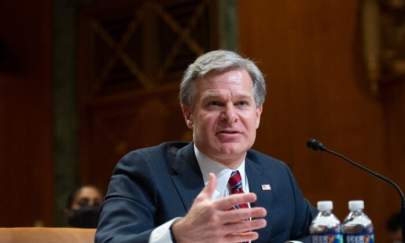China Is World’s Largest Hacking Power, Seeks ‘Global Domination of Technology Sectors’: FBI Director Wray
China is the world’s largest malicious cyber actor and its affiliated hackers have stolen more data from Americans than every other nation combined, according to FBI Director Christopher Wray.
Wray said that China’s communist regime is engaged in a massive campaign to “lie, cheat, and steal their way into global domination of technology sectors,” during a wide-ranging cybersecurity talk at Boston College on June 1.
“The Chinese government is methodical, hacking in support of long-term economic goals,” he said.
“They’ve got a bigger hacking program than all other major nations combined. They’ve stolen more American personal and corporate data than all nations combined. And they’re showing no sign of tempering their ambition and aggression.”
Wray singled out the Chinese Communist Party’s (CCP) use of coercive laws to effectively force technology transfer from U.S. businesses operating in China to the state. In an apparent reference to China’s national intelligence laws, which allow the regime to demand the data of any company in the name of security, he said that many U.S. companies simply accept that they’ll be spied on.
“China’s economy also gives it leverage and tools, sway over companies … For many U.S. and foreign companies doing business in China, or looking to, the cost effectively amounts to a blanket consent to state surveillance in the name of security, at best,” Wray said.
“At worst, they’ve got to accept the risk that their sensitive information may be co-opted to serve Beijing’s geopolitical goals.”
Wray also described how the CCP uses state-mandated tax systems in China to covertly spy on companies on the mainland. He said that Chinese laws require businesses to make use of a small suite of software options for tax purposes, at least one of which was used by the CCP to implant malware into companies’ systems to allow covert government access to the company’s data.
Aside from direct government intervention, Wray said that China, along with Iran and Russia, is hiring hackers as if they were cyber mercenaries, and providing them with state resources to conduct attacks on the United States on China’s behalf.
Such actors, he said, frequently target the defense and industrial sectors to cause havoc, deny access, or steal secrets.
The comments built upon Wray’s previous remarks, such as when he said in April that China is the largest cyber security threat to the United States and warned that the regime is targeting every part of the U.S. economy.
“The biggest threat we face as a country from a counterintelligence perspective is from the People’s Republic of China and especially the Chinese Communist Party,” Wray said during an interview with “60 Minutes” on April 24.
The director also said the FBI opened a new China counterintelligence investigation “about every 12 hours,” that there are currently more than 2,000 such investigations, and that all 56 U.S.-based FBI field offices are engaged in the effort.
As such, the FBI currently maintains a series of web pages dedicated to the “China Threat,” which state that “the counterintelligence and economic espionage efforts emanating from the government of China and the Chinese Communist Party are a grave threat to the economic well-being and democratic values of the United States.”












